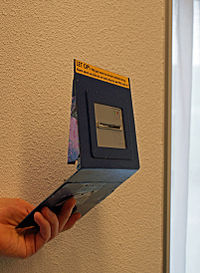
Credit card fraud is an inclusive term for fraud committed using a payment card, such as a credit card or debit card.[1] The purpose may be to obtain goods or services or to make payment to another account, which is controlled by a criminal. The Payment Card Industry Data Security Standard (PCI DSS) is the data security standard created to help financial institutions process card payments securely and reduce card fraud.[2]
Credit card fraud can be authorised, where the genuine customer themselves processes payment to another account which is controlled by a criminal, or unauthorised, where the account holder does not provide authorisation for the payment to proceed and the transaction is carried out by a third party. In 2018, unauthorised financial fraud losses across payment cards and remote banking totalled £844.8 million in the United Kingdom. Whereas banks and card companies prevented £1.66 billion in unauthorised fraud in 2018. That is the equivalent to £2 in every £3 of attempted fraud being stopped.[3]
Credit card fraud can occur when unauthorized users gain access to an individual's credit card information in order to make purchases, other transactions, or open new accounts. A few examples of credit card fraud include account takeover fraud, new account fraud, cloned cards, and cards-not-present schemes. This unauthorized access occurs through phishing, skimming, and information sharing by a user, oftentimes unknowingly. However, this type of fraud can be detected through means of artificial intelligence and machine learning as well as prevented by issuers, institutions, and individual cardholders. According to a 2021 annual report, about 50% of all Americans have experienced a fraudulent charge on their credit or debit cards, and more than one in three credit or debit card holders have experienced fraud multiple times. This amounts to 127 million people in the US that have been victims of credit card theft at least once.
Regulators, card providers and banks take considerable time and effort to collaborate with investigators worldwide with the goal of ensuring fraudsters are not successful. Cardholders' money is usually protected from scammers with regulations that make the card provider and bank accountable. The technology and security measures behind credit cards are continuously advancing, adding barriers for fraudsters attempting to steal money.[4]
- ^ "Credit Card Fraud - Consumer Action" (PDF). Consumer Action. Retrieved 28 November 2017.
- ^ "Official PCI Security Standards Council Site - Verify PCI Compliance, Download Data Security and Credit Card Security Standards". www.pcisecuritystandards.org. Retrieved 1 October 2021.
- ^ "FRAUD THE FACTS 2019 - The definitive overview of payment industry fraud" (PDF). UK Finance.
- ^ "Credit card fraud: the biggest card frauds in history". uSwitch. Retrieved 29 December 2019.